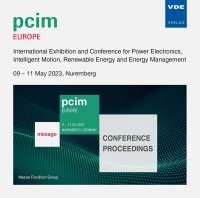Analysis of Moisture-Induced Void Formations within Silicon Carbide Power Modules
Conference: PCIM Europe 2023 - International Exhibition and Conference for Power Electronics, Intelligent Motion, Renewable Energy and Energy Management
05/09/2023 - 05/11/2023 at Nürnberg, Germany
doi:10.30420/566091121
Proceedings: PCIM Europe 2023
Pages: 8Language: englishTyp: PDF
Authors:
DeBoi, Brian T.; Nelson, Blake W.; Kanatzar, Paul; Fraas, Felix; Curbow, Austin; McNutt, Ty (Wolfspeed Inc., USA)
Abstract:
Mitigating moisture within electronics systems is crucial for extending lifetime and preventing premature failures, especially in systems with high operating voltages. Careful consideration of the surrounding environment and cooling techniques must be used to maximize device lifetime. Operating power modules in high temperature, high humidity environments can allow moisture and contaminants to diffuse into the encapsulating gel, which can reduce its dielectric strength or result in corrosion of the substrate. These failure mechanisms are well-known and can be quantified using with high humidity, high temperature, and high voltage reverse bias testing (H3TRB). However, a lesser-known cause of failure is the formation of void regions within the encapsulating gel of power modules due to the rapid expansion of water vapor. This paper studies the relationship between environmental conditions and cooling techniques to further understand void-region induced failures. Equations are provided for calculating the relationship between relative humidity, absolute humidity, dew point, and temperature to determine the conditions of an operating environment. Two power modules with embedded temperature and humidity sensors were subject to high humidity conditions in an environmental chamber with and without a liquid coolant on the baseplate. This testing demonstrates the ability of moisture to penetrate the encapsulating gel, and that sub-ambient cooling is likely to lead to condensation. Finally, it is shown that rapid heating of the die after water condensates creates a major risk of void formation within power modules.


